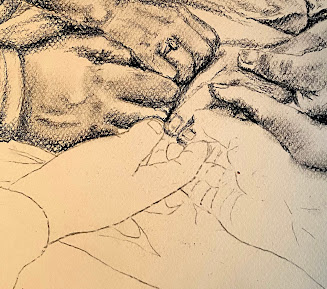Helpful
Caregiving allows us to care for our family members and keep them integrated in our lived but it takes a toll and the stress of caregiving is significant. Sometimes people ask “how can I help?” Most caregivers are overwhelmed with researching information, therapies, treatments, trusted resources or perhaps finding a way to fix the ills of a loved one. Sometimes it is because of this overwhelming responsibility, or because they are simply overwhelmed when someone shows they care, that caregivers often respond with a vague “Thanks, I will let you know”. There are ways to support someone who has taken on the role of caregiver whether it is for a child, a parent, a spouse or another family member, and there are things that just add to the stress of caregiving.
So what is helpful and what is not? How do you support a friend or family member caring for someone else?
Not helpful
Tips and advice that pertain to a child without special needs is not helpful. The same rules do not apply. I remember a Medical Fellow suggesting our baby wasn’t growing at a typical pace because we weren’t feeding him enough. Luckily the Doctor chimed in and explained he was a chubby baby, he was getting enough calories. This was not a parenting fail, but a medical issue. I often hear from others raising a child with special needs who are getting all sorts of unwelcome and unpractical advise on medical or behavioral issues. Don't assume we haven't tried multiple ways to stop a behavior or treat a medical issue. If a parent with a special needs child doesn’t ask for your opinion on their parenting, it isn’t helpful.
It is also not helpful for a stranger to approach and ask
what is (medically) wrong with your child, or loved one as though somehow this would
qualify as their business. If I wanted perfect strangers to know what is
medically wrong with my child I would just print his medical chart on a shirt
to wear out in public. Know that we are caring for more than a medical case. We
are caring for a loved one who happens to be on a medical journey. Your curiosity isn't helpful.
Stating that you are a school paraprofessional or a nurse before asking what is wrong with my child does not change anything. You are still a stranger asking for private medical information, reminding me that the first thing you notice is my son's medical needs. A few summers ago, I was trying to persuade my son to move over to his ticketed, assigned seat as we had just completed a long climb to reach our row. He decided he was tired and sat down in the first seat which wasn’t ours. A woman sat down next to us and explaining that she was a para so she would help, then continued to sit with us and ask questions about his health issues while I tried in vain to convince my tantruming child to move over a few seats. Unless you were one of my child's paras I highly doubt you are going to be able to jump in and help. After a few minutes of listening to my son scream, she decided to move along. Again, not helpful.
Caregiving is not a competition and any suggestions to the contrary are not helpful. I think the worse thing someone said to my Mom who tirelessly cared for my father was that caregiving for a child is harder than a spouse because you have the option to leave a spouse. My Mom was traditional in her commitment to her marriage. Leaving because it wasn’t always fun wasn’t an option. The only thing that made it worse was when it was added that they would not be able to care for a spouse because they were too intelligent to be tied down to full-time caring. Ouch. Not helpful.
Helpful.
The biggest need typically for a caregiver is a break. If you are able, offer to help with cares for a short time to allow the caregiver a break. An uninterrupted hour of running errands or even to just take a bath can relieve a bit of stress.
Be encouraging and kind in your comments. Caregivers are often on a complex, stressful journey. We were fortunate in that both of our Moms told us we were good parents. Tell caregivers they are doing a great job.
Help them feel less isolated. Try to accommodate a visit if
possible. If not, stay connected even if they are often unable to accept most
of your invitations. Caregiving often requires declining outside invitations.
Often these invitations and outside connections eventually stop. A simple invite to
join if you can allows a caregiver to know you are thinking about them and you
care. A phone call to ask how things are
going also can show you care. For a few years my sister talked to my son on the phone almost daily. Each conversation was repetitive yet it meant the world to him. It is amazing what five or ten minutes can mean to someone else.
Show interest if a caregiver needs to talk. Ask them how they are
doing and listen as they speak. They may need to just vent, or talk out a
problem. Listening indicates you care.
For parents of special needs children, celebrate milestones
even if they seem exceedingly late for the child’s chronological age. Every
milestone deserves a celebration especially if a child had to work twice and
hard and twice as long to finally achieve mastery.




Comments
Post a Comment